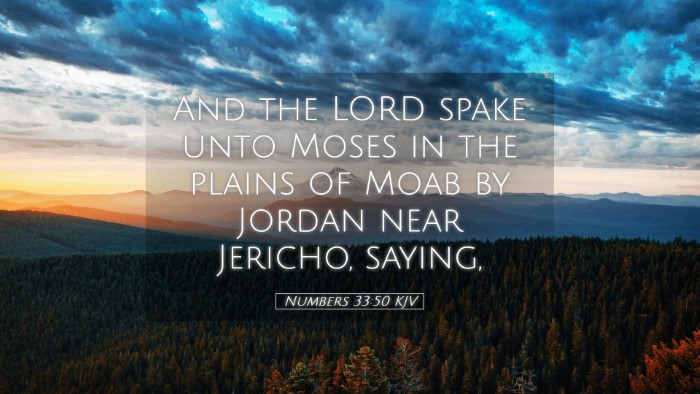Commentary on Numbers 33:50
Numbers 33:50 states, "And the LORD spake unto Moses in the plains of Moab by Jordan near Jericho, saying..." This verse serves as a pivotal moment in the narrative of the Israelites' journey to the Promised Land. It emphasizes God's ongoing communication with Moses and the guidance He provides to His people.
Contextual Overview
This verse marks a significant transition in the Book of Numbers, as the Israelites are on the brink of entering Canaan. The prior chapters recount their journey and the various encounters with opposition and challenges, showcasing God’s faithfulness even amid the hardships faced. At this juncture, God reiterates His authority and intention regarding the land He is giving to the Israelites.
Divine Instruction
In this scripture, God’s command to Moses signifies the necessity of divine instruction before entering into the land of promise. Scholars like Albert Barnes point out that God frequently engages with Moses to prepare his leadership and directly communicates the expectations that will govern Israel in Canaan.
Implications of God’s Call
The call to Moses illustrates God's desire for His leaders to remain attentive to His voice. Matthew Henry notes that the communication from God signifies a moment of preparation, underlining the importance of spiritual readiness before undertaking significant tasks.
God’s Sovereignty and Authority
The mention of God speaking to Moses illustrates His sovereignty. Moses acts not merely as a leader but as a mediator of God’s will. Adam Clarke emphasizes that God's direct communication serves to remind the people of Israel of His authority and the seriousness of the commands they are to follow.
The Significance of the Location
The geographical context, "the plains of Moab by Jordan near Jericho", holds significant meaning as it lies on the cusp of crossing into the Promised Land. This location symbolizes both the culmination of their wanderings and the beginning of a new chapter. Henry explains that this exact backdrop serves to heighten the anticipation of entering a land flowing with milk and honey.
Preparation for Conquest
In subsequent verses, God outlines specific instructions for the conquest of Canaan. Barnes elaborates on how this guidance showcases God's detailed providence and expectation of obedience from His people. Just as God commanded Joshua later in Joshua 1:9, the emphasis is on courage and strength derived from following God’s law and commands.
Application to Modern Believers
The lessons in Numbers 33:50 extend beyond historical context to inform contemporary faith practices. Leaders today are encouraged to seek divine direction and remain responsive to God's voice as they embark on fulfilling their calling. The commitment to listening to God resonates profoundly throughout leadership and ministry.
Theological Implications
This verse exemplifies the crucial relationship between God and His chosen people. It affirms the theological concept of God's covenant, where He not only sets the stage for Israel's inheritance but also establishes the conditions under which they will thrive in the land. God's speaking to Moses is a reminder of His covenant loyalty, which is foundational to understanding the narrative of redemption throughout the Scriptures.
Encouragement Through God’s Promises
Both Henry and Clarke highlight the encouragement that comes through understanding God's promises. As Israel stands on the verge of conquest, it is a reaffirmation that they are not entering the land on their own merit but through God’s providence and promises.
Conclusion
Numbers 33:50 encapsulates themes of divine communication, preparation, and the importance of obedience to God’s commands. For pastors, students, theologians, and Bible scholars, this verse serves as a foundational text illustrating the continued relevance of God’s instruction in the lives of believers today. The historical context provides a backstory, while its theological implications challenge modern readers to cultivate a deeper relationship with God in their journey of faith.
- Key Takeaway 1: The importance of spiritual readiness and attentive listening to God’s voice.
- Key Takeaway 2: Understanding God’s sovereignty and the need for obedience to His direction for fruitful ministry.
- Key Takeaway 3: The significance of God's promises to His people across generations and how history shapes present faith.


